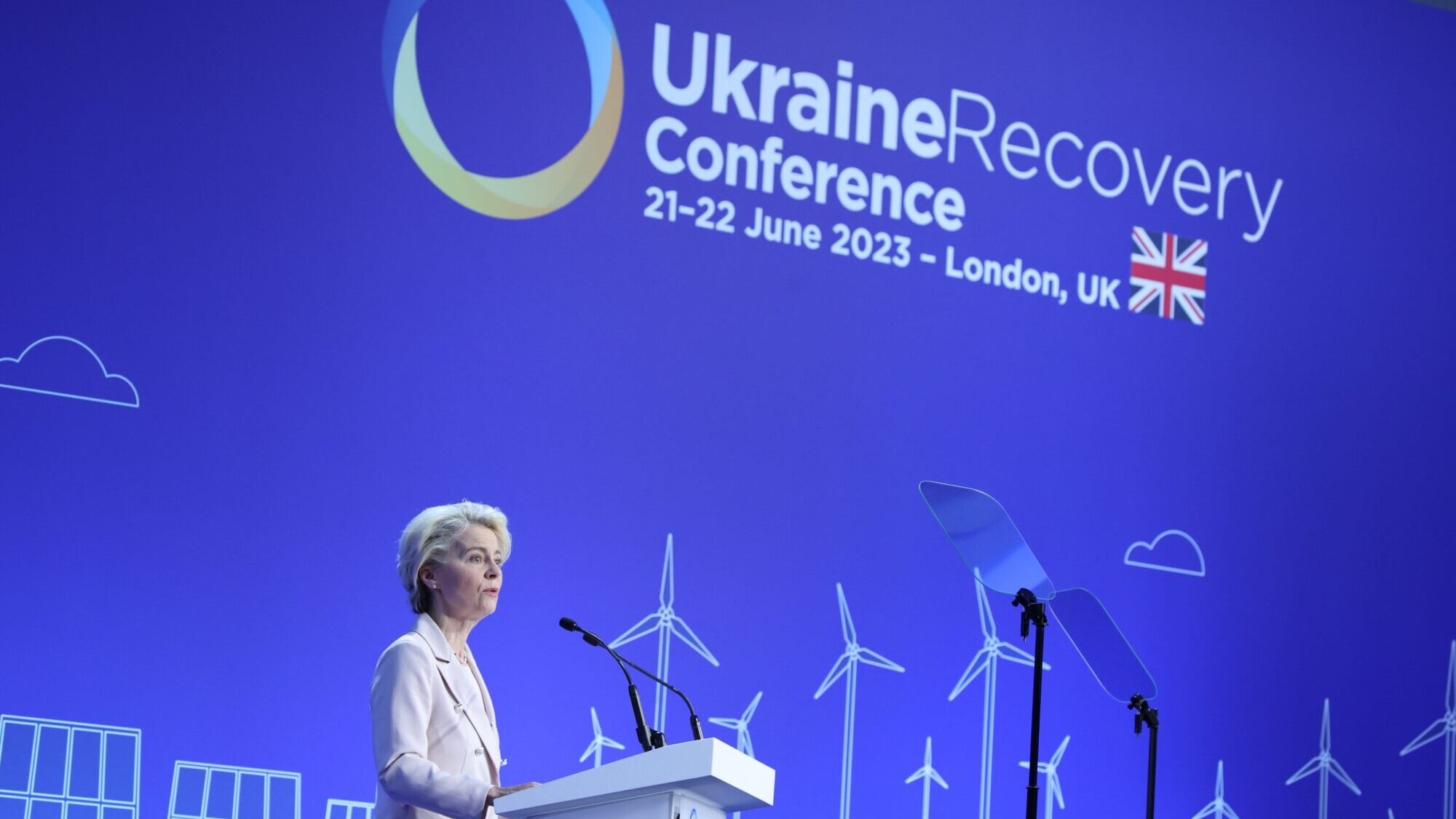
Ursula von der Leyen
Photo: European Commission / Twitter.
Over a thousand decision-makers gathered in London on Wednesday, June 21st, for the second session of the Ukraine Recovery Conference (URC) to commit billions of dollars toward rebuilding the war-torn country. In addition, the aid and foreign investments are designed to further develop the country and prepare it for EU accession, according to Commission President Ursula von der Leyen.
Meanwhile, the European Commission also held a briefing on the enlargement prospects of its eastern neighbors, which painted a more realistic picture of what to expect than the mouth-watering expectations expressed in the speeches at the conference.
The URC conference was nothing short of a giant show of solidarity (and wealth). Besides the thousand politicians representing 61 countries, 32 international organizations, 400 multinational businesses, and some 130 NGOs also came to pledge support to Kyiv.
The keynote speeches were given by the host, British Prime Minister Rishi Sunak, European Commission chief Ursula von der Leyen, and, of course, President Zelensky, who stressed that the reconstruction of Ukraine is not only a global task but an ideological responsibility of the entire West.
PM Sunak opened the conference by outlining the basic plan: Ukraine will be rebuilt by a giant international partnership of governments and businesses, with direct aid leading the process and the private sector taking over the long-term responsibility.
Regarding the former, Sunak recounted that the IMF already pledged a $50 billion recovery loan to Ukraine, while the G7 countries committed $115 billion to these efforts.
Shifting to the latter, the prime minister announced the creation of the Ukraine Business Compact to facilitate foreign investment and innovation in Ukraine, saying that the platform already has 400 members from 38 countries, with a combined total of $3.9 trillion.
In her speech, von der Leyen focused not only on how the country will be rebuilt but also on what post-war Ukraine will look like. According to her (and all the other speakers), the tragedy of war also provides an important opportunity to reshape and modernize Ukraine, making it fit for eventual EU accession.
“A cleaner, greener, more modern Ukraine will be the lasting legacy of this atrocious war,” the commission chief said, also adding that it was the West’s collective responsibility to make it happen.
And by the end of the journey, von der Leyen promised, Ukraine will become “a country that attracts foreign investment, a country that is the master of its future, and a country that is a member of the European Union.”
To that end, she repeated the EU’s financial aid package announcement from the day before, pledging a “constant and predictable” flow of funds worth €50 billion toward Ukraine until the end of 2027, €17 billion of which will be direct assistance (coming from the bloc’s increased budget), and €33 billion will come in form of loans.
According to von der Leyen, Ukraine needs €110 billion in the next few years to make up for its €60 billion fiscal gap and fulfill its €50 billion ‘fast recovery’ needs. Therefore, with this €50 billion EU pledge, Brussels has already pledged 45% of the total, the commission president said, urging others to join the effort.
“We are with Ukraine for as long as it takes,” she added.
On the same day, Enlargement Commissioner Olivér Várhelyi briefed the 27 EU ambassadors on where Ukraine, Moldova, and Georgia’s accession processes stand. The meeting was held behind closed doors, but Euractiv obtained the commission’s internal documents that show what was discussed.
All three of these countries were given a set of criteria to fulfill by introducing systemic reforms, particularly in terms of strengthening the rule of law and fighting corruption. According to the notes, Ukraine has so far implemented 2 out of the 7 criteria it was given, while Moldova has completed 3 out of its 9 recommendations, with Georgia also fulfilling 3 of its 12 checkpoints.
In particular, the EU deemed Kyiv’s efforts sufficient with regard to judicial reforms—the selection of Constitutional Court judges on a competitive basis—and the media law, which sought to implement EU standards in protecting the freedom of the press and broadcast media.
Furthermore, the EU recognized that Kyiv has made certain progress in the fight against corruption and the protection of national minorities as well. However, many important steps have still to be taken, such as “strengthening of the national anti-money laundering system” and a comprehensive law enforcement reform.
Most importantly, the document urges Kyiv to implement the recommendations of the Venice Commission that deal with oligarchs and national minorities—as Ukraine’s 2017 educational law and 2019 language law violated multiple international human rights treaties—and invites lawmakers to “take other systemic measures and consolidate its history of high-level corruption cases.”
“Overall, the focus is on the positive, but it should not be forgotten that this is an informal provisional update intended to help Ukraine strengthen its efforts in the appropriate and necessary areas,” one EU diplomat told Euractiv.
For its part, Kyiv hopes that the EU will deem its reforms in all seven areas sufficient by the end of the year, to start formal accession negotiations as early as January. But since not only the Commission but each member state will have a say in that, the real timeline might be substantially longer.
